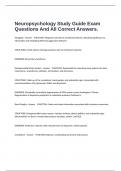Neuropsychology Study Guide Exam
Questions And All Correct Answers.
Amygdala - Answer FUNCTION: Integrates and directs emotional behavior, attaching significance to
information and mediating defensive/aggressive behavior.
STRUCTURE: Limbic system; Damage produces lack of emotional response.
DISORDER: Kluver-Bucy Syndrome.
Extrapyramidal Motor System - Answer FUNCTION: Responsible for executing many aspects of motor
movements--smoothness, initiation, termination, and directness.
STRUCTURE: Made up of the cerebellum, basal ganglia, and substantia nigra. Associated with
neurotransmitters ACH, glutamate, GABA, and dopamine.
DISORDER: Genetically transmitted degeneration of XPM system causes Huntington's Chorea.
Degeneration of dopamine production in substantia produces Parkinson's.
Basal Ganglia - Answer FUNCTION: Codes and relays information associated with voluntary movement.
STRUCTURE: Extrapyramidial motor system. Includes striatum, globus pallidus, and substantia nigra.
Abnormalities w/ Basal + frontal lobe produce tourettes, autism, and OCD.
DISORDER: Parkinson's disease with reduced levels of dopamine. Global aphasia.
Cerebellum - Answer FUNCTION: Balance, coordinating movement and posture.
, STRUCTURE: Makes up the hindbrain (pons + medulla). Part of the extrapyramidal motor system.
Abnormalities linked to ADHD.
DISORDER: Ataxia, slurred speech, severe tremors, loss of balance.
Frontal Lobes - Answer FUNCTION: Motor behavior, movement, planning, decisions.
STRUCTURE: Includes motor, premotor, and prefrontal cortex. Damage can cause contra-lateral motor
aphasia, decreased initiative, deficient self-awareness, risk taking, lack of social consciousness. Low
prefrontal cortex activity is linked to schizo, ADHD, and age-related cognitive declines.
DISORDER: Broca's Aphasia, frontal lobe personality, psychopathic syndrome.
Hippocampus - Answer FUNCTION: Memory consolidation, transfer of information from short-term to
long-term memory.
STRUCTURE: Damage (to hippocampus/amygdala/medial temporal lobes) can cause severe or
permanent anterograde amnesia. Cortisol and stress hormones may impair memory.
DISORDER: Associated with memory loss in Alzheimer's and normal aging.
Hypothalamus - Answer FUNCTION: Homeostasis, fluids, metabolism, appetite for specific nutrients,
sleep. Controls behaviors such as hunger, drinking, feeding, sex, aggression, maternal behavior.
Translates strong feelings into rage, fear, excitement.
STRUCTURE: Located in the diecephalon w/ thalamus in forebrain. Controls autonomic and endocrine
systems via Pituitary gland. Contains suprachiasmatic nucelus (SCN) that controls circadian "body clock"
via the pineal seratonin that modulates wake/sleep & seasonal functions. Lateral area associated with
hunger. Ventromedial area associated with satisfaction. Ventrolateral associated with sleep stages &
switch.
DISORDER: Damage may result in anorexia and adipsia (failure to drink). Destruction of ventromedial
may cause binge eating and excessive appetite.




